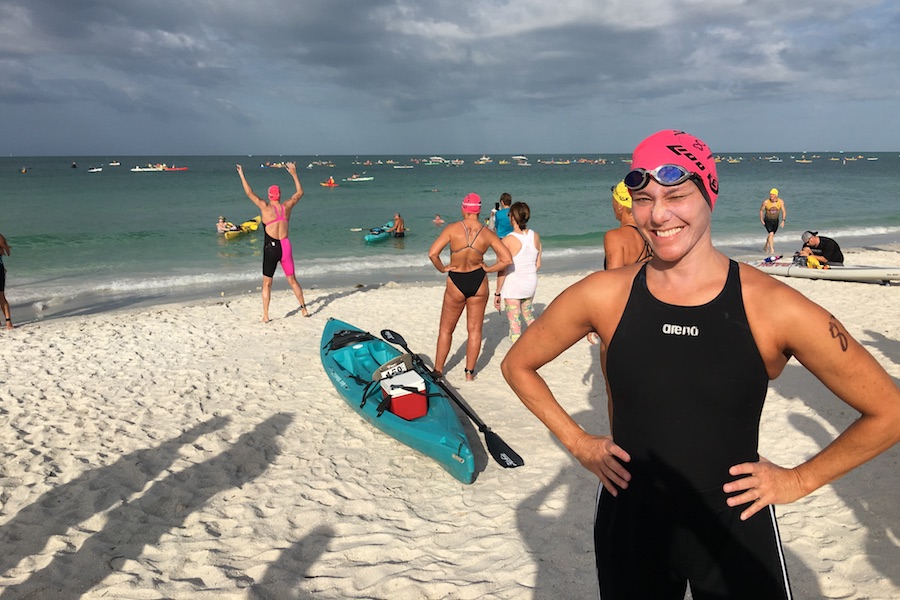
UC Davis professor shares past as former competitive swimmer
It may be hard for students to imagine that current professors were once in college themselves. Some of them were in clubs, some spent time with friends and others even played collegiate sports.
This article is the first in a series of three that will explore the stories of former student-athletes who later became professors. First up is Kimberly Elsbach, a professor of management and Stephen G. Newberry Endowed Chair in Leadership at the UC Davis Graduate School of Management.
Elsbach started swimming competitively when she was 9 years old and was a walk-on swimmer at the University of Iowa in her college days. Elsbach is currently a part of U.S. Masters Swimming (USMS), a national membership nonprofit organization consisting of about 60,000 Masters swimmers. It was originally created to help adults stay in shape, but USMS also offers pool and open-water competitions that 25 percent of its members compete in, according to the USMS website.
The California Aggie had the chance to sit down with Professor Kimberly Elsbach to discuss her collegiate swimming days and her current job as a professor at UC Davis.
How was your experience in collegiate athletics?
“It [Iowa] wasn’t a swimming powerhouse but it was a Division I Big Ten school, so pretty competitive. I was an engineering major, so I had a really full course schedule. Since swimming is one of those sports you have to practice a lot, we would practice from 6:30 a.m. to 7:30 a.m. and then every afternoon we would have weight training for an hour and then another two hours of swimming, six days a week, year-round. It was very time-consuming so it was a challenge figuring out how to do my coursework and swimming. Because of that, I learned how to be very organized, which served me very well in college. I ended up getting a scholarship my senior year, and I usually could score points in the dual meets so I felt like I belonged on the team at that point.”
I read that you are a Masters Swimmer, so is swimming something that you still continue today?
“I swim every day. Last weekend [April 22], I did a seven-mile ocean race down in Florida. I do a lot of open water swimming and we have five national championship open water races at different distances. I won my age group and I got fifth overall which is pretty good given that I am older than some of the other swimmers.”
Why did you choose to become a professor after your collegiate swimming was done at Iowa, and why did you come to Davis to teach?
“My father was a medical school professor, so I think I always really liked the lifestyle he had. He was busy a lot, but he got to do stuff he was interested in, like his research. I think when people think about college it is one of the best times of your life and when you are a professor you always get to be in that environment, which is pretty awesome. I worked for a few years as an engineer but I always planned to go back to school. By luck and chance I got into Stanford, and did my Ph.D. there, which really made me fall in love with Northern California and I never wanted to live anywhere else. I think I was in Davis for about 10 minutes before I decided I really loved it because it is such a great place and now I have been here for 20 years.”
Do you ever miss collegiate swimming?
“I do. I miss being on a team because there is nothing like being on a really close knit team. I think it becomes a family. For me, going to college I didn’t know anybody, but I immediately had this family of my swim teammates and coaches, and I miss that. I am sure all college athletes have that experience.”
Being a former athlete, do you have any general advice for current and/or future student athletes?
“I think it is the best experience. Of what I learned in college, I think that the things I learned that were the most valuable I learned from my time in athletics. Time management is one, but even something like humility. It is important to learn that there is always someone that is going to be better than you. You learn how to support people that are struggling, and those are lessons that I apply every day in my work and research. You don’t have to be an NCAA athlete to learn those things, you can be on a club or an IM sport. The more I learn about undergraduate education the more I learn that getting involved in an activity like this [sports] is really important. I think you do better in school, but I also think you learn more than if you just stick your head down and just do schoolwork. My advice is to take advantage of this opportunity. It may be hard, but you are going to learn so much more, especially when you fail. Take some time to reflect when you fail. If you just get mad with failure, you miss out on the opportunity to learn, and nothing will teach you failure and learning more than athletics.”
Written by Ryan Bugsch — sports@theaggie.org



